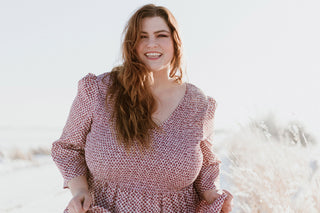
There is a softness in Marielle Elizabeth’s resolve, and a warmth behind the clarity of her words. As a slow fashion advocate for the plus-size community, she is outspoken in her message that true sustainability for Mother Earth means accessibility for all, and that caring for the planet requires radical self-love for everybody, and all bodies.

How did you come to be interested in slow
fashion and how has that been combined with your
advocacy for plus size women?
I fell in love with slow fashion when I was in University, specifically in a local boutique that sold exclusively Canadian made clothing. I was in awe with the quality and timeless designs of each garment - it was also the first time I really thought about who made my clothing, where they lived, the type of life they had and my responsibility as a customer to ask those hard questions. As I got older, my body changed and I was suddenly sized out of the ethical clothing brands I loved. I realized how few options there were for plus size people in ethical fashion, and while my body had changed, my values hadn’t. I started reaching out to designers directly advocating for size expansion, talking to the people who made my clothing. I started working as a fit model and sharing my experiences as a fat person who loved slow fashion on social media, I want to share the work I was doing so other plus size people didn’t have to hunt as hard as I was to find ethically made clothing that dared to fit a size 22/24. It was really empowering to connect and build community with so many other people feeling left out of, what is ultimately a social justice movement.
In your opinion, why is the sustainable fashion space so lacking in the way of representation and inclusivity for all body types?
The fashion industry has a long standing history of marginalizing and omitting plus size bodies, gender diversity, age diversity, racial diversity and disabled people, and while ethical fashion works to reduce so much of the harm that fast fashion creates, it still finds itself rooted in the same Eurocentric beauty ideals of mainstream fashion. Ten years ago, was plus size grading being taught in mainstream fashion programs, were plus size clientele valued and sought out - I think we have to realize how far size inclusion and self love has come in just the last ten years, and I think ethical fashion is still playing a bit of catch up to those movements. In addition to that, I think from a capitalist standpoint, there is more money to be made from teaching someone to hate their body and then promising them that they can buy back that confidence. When I first started this work, I really hated talking about my size, I thought it was irrelevant to conversations around slow fashion, but the deeper I dug into ethical fashion the more I realized accessibility is essential to all of this work, and in addition to that, until we learn to love our bodies through the various sizes and cycles we go through, we will perpetually be trapped in trying to buy beauty instead of seeing it in innately in ourselves. All of these intersections need to be a part of the conversations we’re having surrounding sustainable fashion - we need to be constantly broadening who sees themselves in this movement, and empowering people to join it, at any income, at any point in their live and at any size.
What is your advice for others who are looking to incorporate sustainability into their lives?
Start small - make a commitment that you can uphold, and then once you meet that one, raise the bar higher. Personally, I believe deeply in committing to the 30 Wears Club, the promise that anything I buy I will wear at least 30 times, and then taking that farther to mending and garment care. Fast fashion made it cheaper to buy something new than fix something we already have, and we need to remember the cost isn’t just the price tag, it’s the massive accumulation of fabric / thrown out clothing and wasted resources that making a garment also costs. I also believe that so often we want to buy our way into a movement, when in reality the most sustainable thing you can ever do is wear what you have, use what you own, and reduce your consumption. Finally, I would encourage you to start engaging politically with government regulation, asking your elected officials for climate commitments. Yes, small changes are important, but the planet needs big changes too.
What can we as sustainable fashion brands do to become not only inclusive, but truly welcoming of all body types?
I would love to see sustainable fashion brands push for greater diversity by hiring more diverse voices to be in the room making design choices, brand choices and marketing choices. I can always tell if a garment has been fit tested or designed by a plus size person in the fit and consideration of how a fat person moves through their day. I can tell if a plus size person is on the marketing team by how plus size customers are spoken to and showcased. There is no substitution for lived experience, and the entire fashion industry needs to both acknowledge it’s lack of diversity in powerful positions and then work hard to correct that.
How do you Honor Mother Earth?
By pausing and taking her all in. By appreciating how beautiful and fleeting and delicate all of our ecosystems are - like an orchestra, when the world sings in perfect harmony - and what my job is.The small part I can play to make the music last just a little bit longer.







